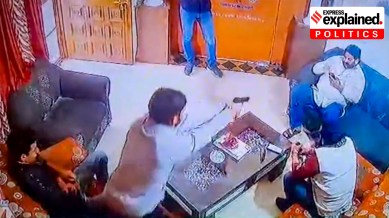Karni Sena chief killed: The outfit’s fractious trajectory, over the years
The Karni Sena has been in the news for various reasons over the years — most notably during the protests against the movie Padmaavat — even as multiple groups with similar names have sprung up.

The chief of Shri Rashtriya Rajput Karni Sena (SRRKS), Sukhdev Singh Gogamedi, was shot dead in Jaipur on Tuesday, with Rajput outfits calling for a Jaipur bandh on Wednesday.
The Karni Sena has been in the news for various reasons over the years — most notably during the protests against the movie Padmaavat — even as multiple groups with similar names have sprung up.
monthly limit of free stories.
with an Express account.
The many Karni Senas
The expression ‘Karni Sena’ is now loosely used to describe several similar Rajput outfits spread across North Indian states. Perhaps the oldest is Shri Rajput Karni Sena (SRKS), which was founded in 2006. The outfit headed by Gogamedi is a splinter faction of this organisation.
Two people claimed to have founded the SRKS — the late Lokendra Singh Kalvi, an unsuccessful politician, and Ajit Singh Mamdoli, a builder. Mamdoli and Kalvi parted ways after the 2008 Rajasthan Assembly elections, and ran parallel factions with the same name, even fighting a court case over the name SRKS.
Kalvi and Gogamedi
The 6-foot-plus Kalvi was Karni Sena’s most visible face during the Padmaavat protests, when he travelled extensively to rally Rajputs in Northern states against the film. He emerged as the tallest figure of the Karni Sena, and remains one even after his death in March this year.
Kalvi was the son of Kalyan Singh Kalvi, a Minister in Prime Minister Chandra Shekhar’s government. Lokendra Kalvi contested the Lok Sabha elections in 1993 as an Independent, and in 1998 on a BJP ticket. He lost both times. In 1999, Kalvi left the BJP and started an agitation along with another former BJP leader to seek reservation for the poor among forward castes, including Rajputs. In 2004, he returned to the BJP. Kalvi tried unsuccessfully for a Congress ticket in the Lok Sabha elections of 2009.
In 2015, Kalvi expelled the state president of his faction of SRKS, Sukhdev Singh Shekhawat alias Sukhdev Singh Gogamedi following differences between the two, after which Gogamedi set up the SRRKS.
The Mamdoli-led SRKS and Gogamedi-led SRRKS announced a merger in October 2021, with Gogamedi continuing as president of SRRKS.
As per Mamdoli, there are currently three Karni Senas which directly trace their roots from the 2006 SRKS: one SRKS led by Kalvi’s son Bhawani Singh Kalvi, a second SRKS led by Mahipal Singh Makrana and the third one, SRRKS, which was led by Gogamedi and has Mamdoli as its national convenor.
Rajput vs Jat
Both Mamdoli and Kalvi agreed that the SRKS was founded as a result of the Rajputs’ struggle with their traditional rivals, the Jats, in 2006. That year, Anandpal Singh, a Rajput and then Rajasthan’s most notorious gangster, killed Jivan Ram Godara and Harphool Ram Jat in Didwana, allegedly over control of the illicit liquor business. Mamdoli and Kalvi alleged that as Jats protested, they got support from a wide spectrum of political leaders, and the police allegedly detained any Rajput man who could be linked to Anandpal.
To resist this “hounding”, the SRKS was founded on September 23, 2006, with 11 declared aims, including opposing “political or social malice” against Rajputs, the misrepresentation of history or historical figures, and promoting Rajput unity. The outfit was named after Karni Mata, a goddess revered across Rajasthan but whose principal seat is at the famous rat temple in Deshnok near Bikaner.
Demands and protests
In 2008, the SRKS protested Ashutosh Gowariker’s Jodhaa Akbar over “inaccurate portrayal of history”. Also in 2008, it called a Jaipur bandh to protest a lathicharge on Brahmins, claiming that it was the duty of “Kshatriyas” to “protect society”.
In 2012, the SRKS called a bandh after BJP MLA Rajendra Rathore, later a senior Cabinet Minister, was arrested by CBI in connection with a fake encounter case. The following year, SRKS threatened to disrupt the Congress’s Chintan Shivir and confront AICC president Sonia Gandhi over the issue of reservations.
Among other things, over the years, SRKS has demanded that Rajasthani be recognised as a state language under Schedule VIII of the Constitution, and that a statue of Maharana Pratap be erected at the Kashmere Gate ISBT in Delhi.
As for the SRRKS, it was members of this outfit that assaulted director Sanjay Leela Bhansali in January 2017 during Padmaavat’s shooting at Jaigarh fort in Jaipur. More recently, in April this year, the Gogamedi-led group organised a Kesariya Mahapanchayat in Jaipur and demanded an increase in EWS quota for general castes from 10 per cent to 14 per cent.
Political relevance
Rajputs in Rajasthan have traditionally supported the BJP, while Jats have supported the Congress. After the BJP’s loss in the 2018 Assembly polls, anger among Rajputs over the Padmaavat issue and Anandpal’s encounter was cited as one of the key reasons.
Rajputs are among the most politically relevant and powerful communities in Rajasthan and are key voters in about 25 seats, or 1/8th of the total 200 Assembly seats.
Rajput leaders say the Karni Sena is trying to raise its profile by claiming for itself the historical role of “foot soldiers” of the society at large.